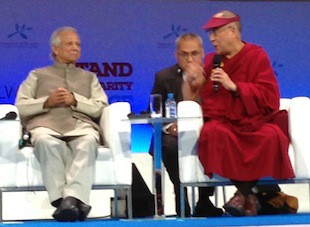Read this article in Spanish here.
WARSAW, POLAND. The 13th World Summit of Nobel Peace Laureates has brought together over 6,000 attendees from all over the world to “Stand in solidarity for peace,” as the summit’s motto goes.
Part 1 of the “Highlights from the World Summit of Nobel Peace Laureates” singled out key points from Mairead Maguire, Frederik Willem de Klerk, Prof. Dr. Muhammad Yunus, Dr. Ira Helfand, Lech Wałęsa, Peter Launsky-Tieffenthal and Dr. Shirin Ebadi.
Today witnessed more calls to action from the laureates, including His Holiness the XIV Dalai Lama.
Upon being asked whether violence is ever a solution, the Dalai Lama replied that,
“I am not an expert. […] The violent method is very dangerous. Violence creates more unexpected problems.“
Specifically, he mentioned sending a letter to former US President George W. Bush on September 12th, 2011, asking him to use non-violence to solve conflicts. Upon meeting Bush again later, the Dalai Lama said to him,
“I love you. But I have some reservations about your policies.”
World peace, along with eliminating the gap between rich and poor, were among the topics mentioned by the Dalai Lama. It is the responsibility of both the rich and the poor to eliminate this breach. While the rich should help by providing education, training, and materials, the poor should develop self-confidence and work hard.
As for his struggle in Tibet, the Dalai Lama was adamant about the fact that he and his followers are not seeking independence.
“China can provide good dishes, we can provide them with food of mind.”
In the same session, Mairead Corrigan-Maguire, whose speech about peace in Syria is available at ROOSTERGNN here, once again spoke about the fact that people should not buy in to misinformation.
“We need to mobilize. […] We need to learn the ways of non-violence, because they have not been taught.”
Melissa Fleming, United Nations High Commissioner for Refugees, received a question about how she personally is dealing with the recent criticism of the United Nations. First, she made clear that there is a distinction between the humanitarian UN (based in Geneva) and the political UN (based in New York. The humanitarian UN often times has to clean up the consequences of political mismanagement.
“The UN and other organizations are vital to peace and security. But they are only as good as their members.”
A statement that could apply to the world as a whole. Time to act.

